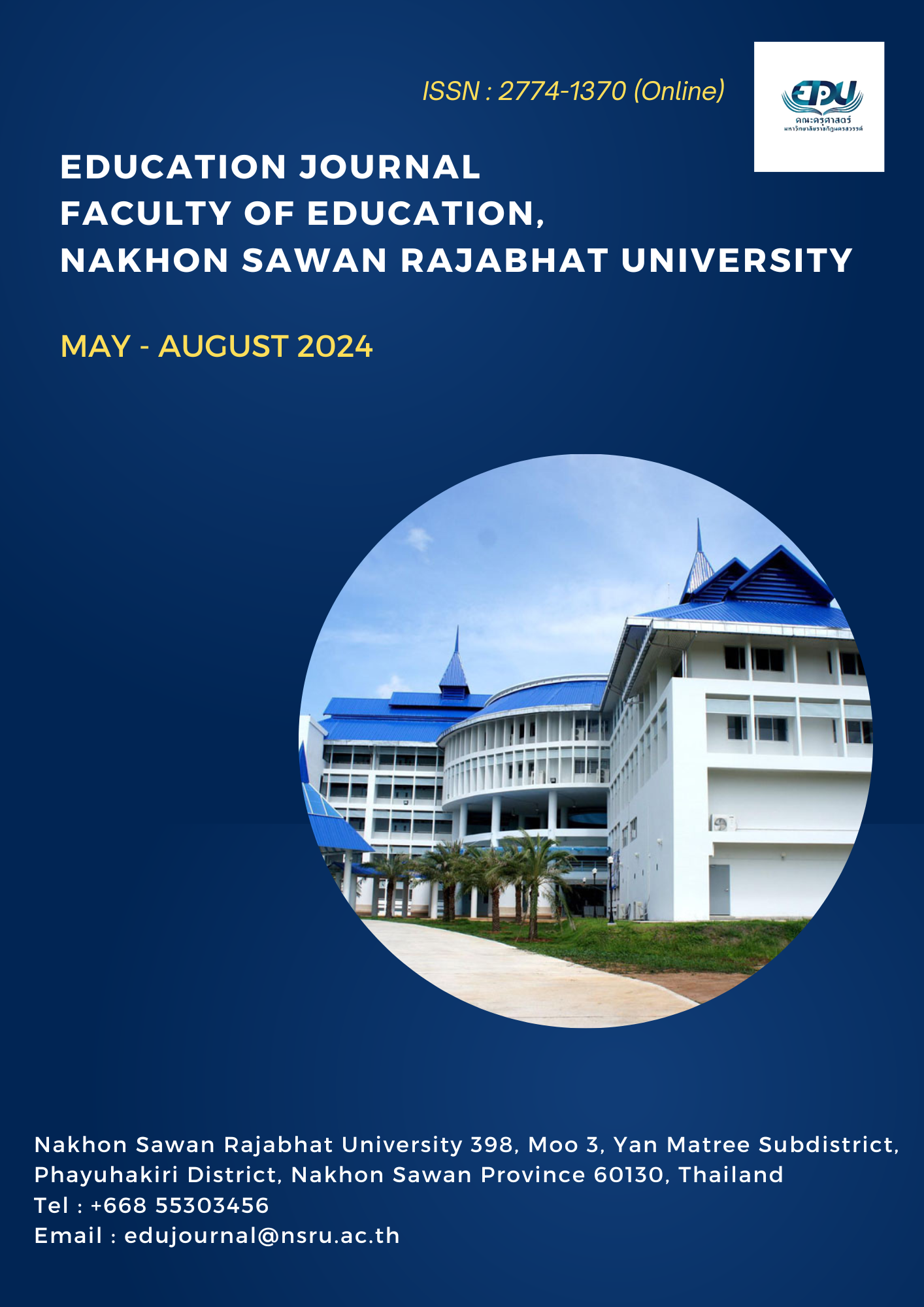The Guidelines for the Development of Administrators Transformational Leadership under the Phichit Primary Educational Service Area Office 2
Main Article Content
Abstract
The purposes of this research were to study, find the guidelines and evaluate the guidelines for the development of administrators transformational leadership. The research was divided into 3 steps: 1) studying the transformational leadership of administrators. The sample consisted of 285 teachers that obtained by using Krejcie & Morgan formula and simple random sampling. The instrument used in collecting the data was a questionnaire concerning the transformational leadership of administrators with the validity between 0.67 - 1.00 and the reliability at 0.89. Data was analyzed by mean and standard deviation, 2) Finding the guidelines for the development of administrators transformational leadership was conducted by the discussion group comprising 7 experts. The instrument used in collecting the data was the recording form of discussion group. Data was analyzed by content analysis and 3) evaluating the guidelines for the development of administrators transformational leadership. The sample were 30 administrators. The instrument used in collecting the data was the evaluation form concerning the guidelines for the development of administrators transformational leadership with the validity between 0.67 - 1.00 and the reliability of 0.97. Data was analyzed by mean and standard deviation.
The research results were found as follows;
1. The level of administrators transformational leadership in overall was at the high level. When considering in each aspect, it was found that the highest transformational leadership was the ideological influence, followed by the consideration of the individual, the intellectual stimulation and the inspiration creation, respectively. 2. The guidelines for the development of administrators transformational leadership were as follows: 1) the ideological influence was the administrators should be the leaders of thinking, practical and be a good role model by working for the success of school. 2) The inspiration creation was the administrators should be a leader in work, supervise the work, support, create and encouragement the morale for co-workers. 3) The intellectual stimulation was the administrators should find the ways to prevent problems, and use a variety of systematic problem solving methods and 4) The consideration of the individual was the administrators should have the ability and consider the individual differences in assigning work appropriately. 3. The evaluation of the guidelines for the development of administrators transformational leadership in overall was at the highest level. The aspect of accuracy was at the highest level. The aspect of appropriateness was at the highest level. The aspect of feasibility was at the highest, and the aspect of usefulness was at the highest level.
Downloads
Article Details

This work is licensed under a Creative Commons Attribution-NonCommercial-NoDerivatives 4.0 International License.
References
กระทรวงศึกษาธิการ. (2560). แผนการศึกษาแห่งชาติ พ.ศ. 2560 – 2579. กรุงเทพฯ: ผู้แต่ง.
_______
. (2562). พระราชบัญญัติการศึกษาแห่งชาติ (ฉบับที่ 4) พ.ศ. 2562. กรุงเทพฯ: ผู้แต่ง.
เกล้ารจิกา ถวัลย์เสรี (2557). ภาวะผู้นำการเปลี่ยนแปลงของผู้บริหารสถานศึกษา สังกัดเทศบาล เมืองโพธาราม จังหวัด
ราชบุรี. การค้นคว้าอิสระศึกษาศาสตรมหาบัณฑิต (การบริหารการศึกษา). มหาวิทยาลัยศิลปากร.
ชาญชัย อาจินสมาจาร. (2557). การพัฒนาผู้นำ. ปัตตานี: สถาบันเพื่อความก้าวหน้าทางวิชาการ.
นารินทร์ เดชสะท้าน. (2557). ภาวะผู้นำการเปลี่ยนแปลงของผู้บริหารสถานศึกษา สังกัดสำนักงานเขตพื้นที่การศึกษา
ประถมศึกษากาฬสินธุ์ เขต 3. วิทยานิพนธ์ครุศาสตรมหาบัณฑิต (การบริหารการศึกษา). มหาวิทยาลัยราชภัฏ
กาฬสินธุ์.
ปรเมธ สมบูรณ์. (2556). ภาวะผู้นำการเปลี่ยนแปลงของผู้บริหารสถานศึกษาขั้นพื้นฐาน อำเภอเวียงแก่น สังกัดสำนักงาน
เขตพื้นที่การศึกษาประถมศึกษาเชียงราย เขต 4. การศึกษาค้นคว้าอิสระการศึกษามหาบัณฑิต (การบริหาร
การศึกษา). มหาวิทยาลัยพะเยา.
ภรณ์วดี ประเสริฐดี. (2558). การศึกษาสภาพและแนวทางการพัฒนาภาวะผู้นำการเปลี่ยนแปลง ของผู้บริหาร
สถานศึกษาสังกัดสำนักงานเขตพื้นที่การศึกษาประถมศึกษาสุโขทัย เขต 2. วิทยานิพนธ์ครุศาสตรมหาบัณฑิต
(การบริหารการศึกษา). มหาวิทยาลัยราชภัฏพิบูลสงคราม.
ภารดี อนันต์นาวี. (2557). หลักการ แนวคิด ทฤษฎีทางการบริหารการศึกษา. ชลบุรี: มนตรี.
รัตติกรณ์ จงวิศาล. (2556). ภาวะผู้นำ: ทฤษฎีการวิจัยและแนวทางสู่การพัฒนา. กรุงเทพฯ: สำนักพิมพ์แห่งจุฬาลงกรณ์
มหาวิทยาลัย.
สันติ บุญภิรมย์. (2557). การบริหารงานวิชาการ. กรุงเทพฯ: บุ๊คพ้อยท์.
สัมมา รธนิธย์. (2560). หลักทฤษฎีและปฏิบัติการบริหารการศึกษา. (พิมพ์ครั้งที่ 4). กรุงเทพฯ: ข้าวฟ่าง.
สิริชัย นนทะศรี. (2559). การศึกษาความสัมพันธ์ระหว่างภาวะผู้นำการเปลี่ยนแปลงของผู้บริหารกับการทำงานเป็นทีมที่มี
ประสิทธิภาพของสถานศึกษา สังกัดสำนักงานเขตพื้นที่การศึกษามัธยมศึกษา เขต 3. วิทยานิพนธ์ครุศาสตร
มหาบัณฑิต (การบริหารการศึกษา). มหาวิทยาลัยราชภัฏพระนครศรีอยุธยา.
สำนักงานเขตพื้นที่การศึกษาประถมศึกษาพิจิตร เขต 2. (2564). ข้อมูลสารสนเทศ. สืบค้นเมื่อ 2 กุมภาพันธ์ 2565, จาก
http://bigdata.phichit2.go.th/.
อรอุมา ศรีประทุมวงศ์. (2563). การศึกษาภาวะผู้นำการเปลี่ยนแปลงของผู้บริหารสถานศึกษา ศูนย์การศึกษานอกระบบ
และการศึกษาตามอัธยาศัยอำเภอ กลุ่มจังหวัดภาคตะวันออกเฉียงเหนือตอนบน 2. วิทยานิพนธ์ครุศาสตร
มหาบัณฑิต (การบริหารการศึกษา). มหาวิทยาลัยราชภัฏสกลนคร.
อรุณี ทองนพคุณ. (2558). การศึกษาบทบาทการบริหารงานของผู้บริหารสถานศึกษาสังกัดสำนักงานเขตพื้นที่การศึกษา
ประถมศึกษาฉะเชิงเทรา. วิทยานิพนธ์ครุศาสตรมหาบัณฑิต (การบริหารการศึกษา). มหาวิทยาลัยราชภัฏรำไพ
พรรณี.
Bass, & Avolio. (1994). Transformational leadership development. Pola Alto, California: Consulting
Psychologists.


